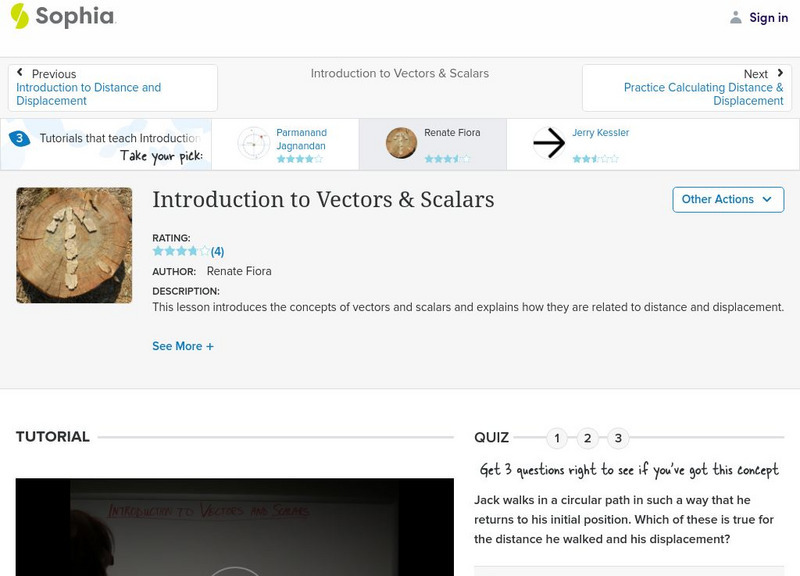Corbett Maths
Vectors
Come in on a vector. A video introduces vector notation and basic definitions. Given a shortened version of representing the vector, the presenter shows how to add vectors algebraically. Using parallelograms and trapezoids, the resource...
3Blue1Brown
Vectors, What Even Are They? | Essence of Linear Algebra, Chapter 1
Take a look at vectors as geometric objects and then as an algebraic concept. The second video in a series of 15 introduces the vector using three perspectives: the physics, computer science, and mathematical. The resource shows the...
Khan Academy
Khan Academy: Linear Algebra: Defining the Angle Between Vectors
Video uses the vector triangle inequality and the law of cosines to demonstrate and prove the definition of the angle between vectors. Uses the definition of the angle between vectors to define perpendicular vectors. Shows that the dot...
Khan Academy
Khan Academy: Linear Algebra: Vector Dot Product and Vector Length
Video first reviews vector addition and multiplying by a scalar multiple. Gives notation for dot product and shows example of calculating the dot product of vectors. Then gives the formula for vector length and gives examples of using...
Khan Academy
Khan Academy: Linear Algebra: Unit Vectors
Video first introduces what a unit vector is. Shows how to construct a unit vector using scalars. Shows notation for unit vectors. [6:59]
Khan Academy
Khan Academy: Linear Algebra: Defining the Angle Between Vectors
Video shows using the vector triangle inequality and the law of cosines to demonstrate and prove the definition of the angle between vectors. Uses the definition of the angle between vectors to define perpendicular vectors. Shows that...
Khan Academy
Khan Academy: Linear Algebra: Vector Dot Product and Vector Length
Video first reviews vector addition and multiplying by a scalar multiple. Gives notation for dot product and shows example of calculating the dot product of vectors. Then gives the formula for vector length and gives examples of using...
Khan Academy
Khan Academy: Vector Dot Product and Vector Length
Definitions of the vector dot product and vector lengthVideo first reviews vector addition and multiplying by a scalar multiple. Gives notation for dot product and shows example of calculating the dot product of vectors.
Khan Academy
Khan Academy: Electricity & Magnetism: Dot & Cross Products
Calculating the dot and cross products when vectors are presented in their x, y, and z (or i, j, and k) components. [9:47]
Sophia Learning
Sophia: Introduction to Vectors & Scalars
Learn about vectors and scalars in physics, and find out how they are related to distance and displacement. [5:19]
Khan Academy
Khan Academy: Linear Algebra: Unit Vectors
Video first introduces what a unit vector is. Shows how to construct a unit vector using scalars. Shows notation for unit vectors. [6:59]
Khan Academy
Khan Academy: Linear Transformation Examples: Unit Vectors
What unit vectors are and how to construct them.
Virtual Nerd
Virtual Nerd: What Is a Vector?
Vectors have both length and a direction. Follow along with this tutorial to learn about vectors and their parts and also how to name one. [3:09]
PatrickJMT
Patrick Jmt: An Introduction to Vectors Part 1
Tutorial provides an introduction to vectors including magnitude, direction, length, and component form. [4:45]
Khan Academy
Khan Academy: Vector Addition & Magnitude: Magnitude of Vector Sums
Explains some interesting properties of the magnitude of vector sums. [5:30]
PatrickJMT
Patrick Jmt: Vectors: Finding Magnitude or Length
Easy to understand tutorial gives the formula and provides a couple examples of finding the magnitude, or length, or a vector. [3:32]
Khan Academy
Khan Academy: Adding Vectors in Magnitude & Direction Form (1 of 2)
Watch Sal add two vectors given in magnitude and direction form by breaking them down into components first.
Sophia Learning
Sophia: Introduction to Vectors & Scalars: Lesson 2
This lesson introduces the concepts of vectors and scalars and explains how they are related to distance and displacement. It is 2 of 3 in the series titled "Introduction to Vectors & Scalars."

















